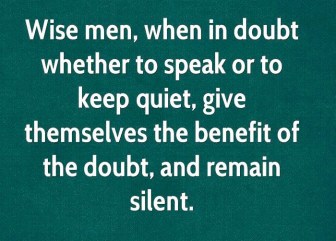Give Others the Benefit of the Doubt, It’ll Make You Happier!
Do you find it easy to give other people the benefit of the doubt?
What does it even mean to give others the benefit of the doubt? The generally accepted—and rather loose definition—is to believe someone (take them at their word) even though you may harbor some doubts.
When someone I know behaves in a way that is out of character, I always give them the benefit of the doubt. If a friend arrives extremely late for a get-together, I automatically assume something has gone wrong; traffic delays, an unexpected phone call, etc.
If the person is a stranger and acts in a rude, strange, or unpleasant way, I still give them the benefit of the doubt. Who knows, maybe they received some bad news, perhaps they are in physical pain?
Years ago, when we first arrived in the US, I was on the sharp end of not being given the benefit of the doubt, and it was rather shocking to me.

The incident occurred when I volunteered to co-chair a school program. Another mother—whom I had only known for a few months—was the other chair. As we planned the event, we thought it would be fun to welcome the participating children by serving Munchkins, also known as donut holes. Imagine mini ball-like doughnuts.
It meant a relatively early-morning run to Dunkin Donuts, but I said I was happy to do it. Now, remember, I had been in the country for only a few months and had never set foot in a Dunkin Donuts store. (Trying to figure out how to drive on the wrong side of the road, manage the strange money—what the heck is a dime?—raise a 3-year old, and start a 6-year old in school, all while my husband worked in another State, didn’t leave me a lot of time to buy fried cakes!)
On the morning of the event, I trotted into the closest Dunkin Donuts (one town over from ours) with my three-year-old son beside me. When it was my turn, I ordered two boxes of Munchkins. They usually keep a few boxes prepped, and within minutes two were placed in front of me. I added in two coffees for the other mother and me. It was at this point that I whipped out my debit card. I was met with a withering look.

As everyone in the queue (sorry, line) glared at me, the cashier loudly explained that it was Cash Only.
I was stunned. Coming from South Africa, where no one had carried cash in decades, I stood open-mouthed. This was the start of the year 2000, and they didn’t accept debit cards? Just months ago, before we left Cape Town, I wouldn’t have thought twice about using my debit card to buy an apple!
Slightly frantic, I asked where I could find the closest ATM. But, by this time, the cashier was well and truly done with me. A man in the line took pity on me and provided directions—it was in the next town.
Well, as you can imagine, by the time I arrived at the school, I was almost half an hour late. I rushed through the main doors of the school and ran into an ice wall. The other mother was beyond furious. As I stumbled my way through an explanation, she stood, hands on hips, before spitting out: “You’re telling me you’ve never bought anything at Dunkin Donuts?”
Again, I stood slack-jawed. We had moved to a close-knit town, and this was a small school; everyone knew about the new-people-from-Africa. Did she think I was lying? Did she assume every immigrant made a bee-line to a donut shop the moment they stepped off the plane? Could she not even conceive that maybe my life experiences were a little different from hers?

Thankfully, the children and parents started to pour in for the event, and there was no time to respond, but she made it perfectly clear that I had behaved inexcusably. The problem was, I did have an excuse or, more accurately, a reason.
It is over twenty years since that morning, and to this day, I am still saddened by the fact that she couldn’t see her way to giving me the benefit of the doubt.
In the subsequent years, I have observed many times when people didn’t offer others the benefit of the doubt. Researchers have proved that we feel happier when we surround others with warmth and support.
I always try to extend grace to others until they prove me wrong. It takes hardly any effort to give someone the benefit of the doubt, but stop if you see a pattern emerging. Arriving late for one lunch is acceptable. Being constantly late for everything is not. If you find you need to give someone the benefit of the doubt over and over again, that’s when you reconsider. Repeat behavior shouldn’t be excused, and you have to accept you cannot change someone.
We are about to re-enter a new chapter in our world. I suspect that different people will restart their interactions at different speeds, and many of us will need to polish our rusty interpersonal skills.
Let’s all try to believe something good about others even when there is the possibility, we may be wrong. Let’s all work on giving others the benefit of the doubt.

I have always believed in the good in all people. Unfortunately I have been disappointed many times. I still believe that there are more good people than bad. Just hope I am not wrong. Love your blog Jane.
Thank you for the kind words about the blog, Linda. Yes, it’s disheartening when people let us down. We have all experienced those times.